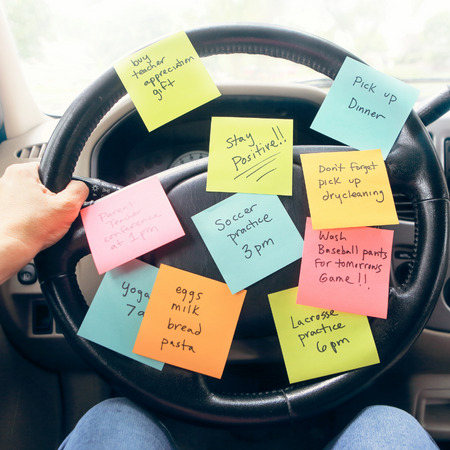If you’re a student or young adult, you must have reached a point of disorientation
from having too much schoolwork to do or too many work engagements to finish. If you’re a parent, you may have either heard your child saying “Sabaw na ‘ko,” as if they could no longer listen to whatever you were about to say, or you may have felt “sabaw” yourself with all the things that need to get done around the house. Thing is, all of us must have experienced being sabaw at least once in our lives, and probably multiple times when we stay in an environment where there is too much going on.
So, why does being sabaw happen?
Being sabaw, or what we call a ‘cognitive overload’, happens when our brain cannot adapt to the amount of information given (often an amount that is too much), or to the too many tasks that need to be done at once. As a result, processing information and performing tasks becomes more difficult, and at worst, not even possible.
No matter how keen a person may be, they have a limit to how much they can process in a given amount of time. Even the most intelligent of people can process only so much.
When it comes to being sabaw, some respond with frustration while some may even respond to it lightly with humor (e.g., Nako, sabaw ka na naman, friend!). Regardless of what you feel about being sabaw, it can be reassuring to know that you don’t always have to be held back by it. So, here are five ways to overcome it:
Five ways to overcome being sabaw:
1. Try to stay away from distractions.
In the time of social media, it is so easy to be swept by the urge to check your phone, go to social media and check out what is interesting to see. Chances are, you may not immediately feel sabaw after browsing through your phone but you may feel it as soon as you get back to your important task, especially if what you had just consumed was heavy or engaging information. Eliminate other sources of distracting information by going to a peaceful environment, whether it’s a specific room in the house or a coffee shop with few to no distractions, and turn off/ silence your phone. Lastly, bring your phone back as a reward for completing a task.
2. Do one thing at a time.
Contrary to popular opinion, multiple studies have shown that multitasking is not very beneficial—it actually makes us less efficient and more prone to errors. The negative impact of multitasking to folding laundry while watching TV or listening to music may not be as felt as when you write an email while listening to a meeting. The disadvantage of multitasking is more clearly seen when tasks become more complex. One study had found that heavy multitaskers (those who believe that multitasking helps them with their performance) actually performed worse in the activity of multitasking than those who like doing one thing at a time. This is because the multitaskers had more difficulty organizing their thoughts and were slower in switching from one task to another—essentially, multitaskers are more highly like get into a state of sabaw in the midst of accomplishing tasks. So, learn to set other things aside and try to focus your energy and effort on one thing at a time.
3. Take breaks and don’t do other work in those breaks.
If you have freed yourself from distractions and learned how to do things one at a time, you may still find yourself feeling sabaw if you overuse your brain for a prolonged amount of time. Hence, taking a break is helpful regardless of how simple or how complex a task is. It’s just that you’re more likely to get sabaw sooner when you solve a series of calculus equations within an hour as compared to reading a light novel within the same duration. You can do anything during your break as long as it is not work. Meanwhile, the length of breaks that you need may depend on various factors such as your current health state (e.g. whether or not you’ve had enough rest, sleep, and energy), the complexity of the task, and the urgency of finishing the task. But if everything is kept constant, taking a break of 15-20 minutes every after 50-90 minutes is considered beneficial and can keep you from being
sabaw. Going beyond 20 minutes, of course, will not make you even more sabaw although it may affect other important priorities in your activity such as momentum and productivity.
4. Plot a schedule and write notes for reminders of activities that you need to get back to.
Sometimes the list of things that you have to accomplish can get very overwhelming. Even if you try to take breaks, you still get overwhelmed and fear that you’d hit that state of sabaw soon. If that does happen, then that is likely a result of too much mental activity consumed by the worrying of other activities that haven’t even started yet. To help bring you at peace and certainty, try to plot a schedule for the set of activities that you need to get done and put them on paper or in a digital note. Relying too much on our working memory for reminders and specific details can sometimes be disadvantageous given that our brain can only take in information at a certain capacity. Unnecessary worry and stress may ease when you have realistic schedules and plans in place.
5. Withdraw from other commitments or other activities.
There are many aspects in our lives that demand our attention, may it be school, work, family, community, and relationships. But sometimes, they can lead us to overcommitment. The initial consequence of overcommitting can be feeling sabaw at first, then burnout after. If you have done tip #4 and still find yourself overwhelmed, it may be possible that your schedule of activities and/ or commitments may be unrealistic and too tiring for you. In that case, learn how to let go by saying no, turning over the responsibility to someone else, ask for help to relieve the responsibility from you, or a combination of all of those. Our brains can only handle so much that when we force things, we may end up accomplishing less commitments than what we had initially expected because of too many sabaw moments and burnout.
References:
Supertaskers: Profiles in extraordinary multitasking ability
Executive control of cognitive processes in task switching
Give me a break

